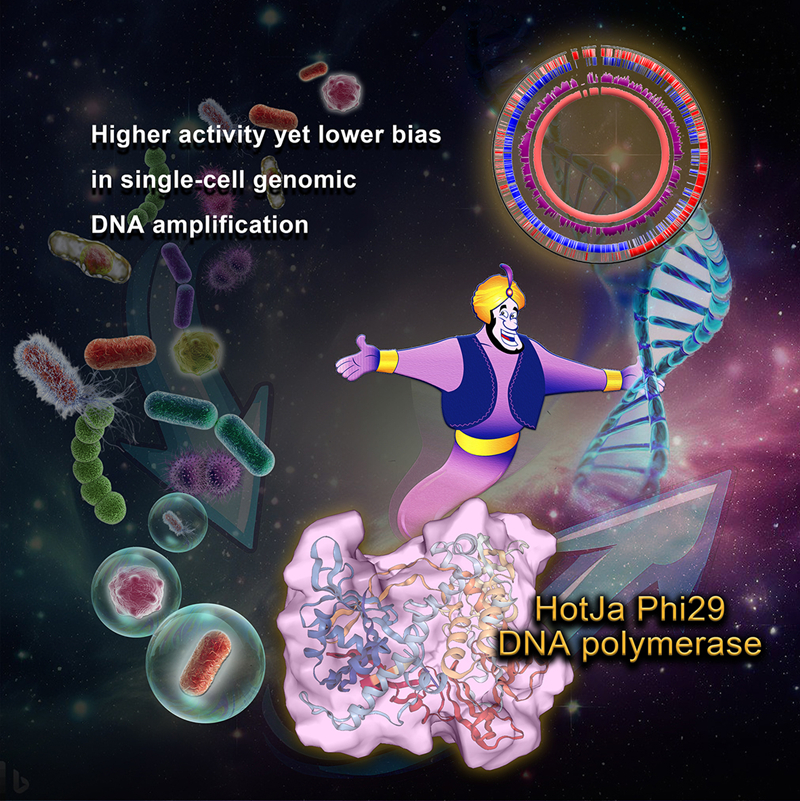Bacterial Single-cell Whole Genome Sequencing Overhauled by Eengineered Polymerase
Sequencing the genome of single bacterial cells has long been technically difficult due to the seemingly incorrigible bias in the gene amplification stage of the process, making it hard to produce high-coverage genome sequence from precisely just one bacterial cell.
A new process developed by researchers at the Single-Cell Center, Qingdao Institute of Bioenergy and Bioprocess Technology (QIBEBT) of the Chinese Academy of Sciences (CAS), however, greatly reduces that bias, opening up whole new vistas of single-cell research.
The study was published in Frontiers in Bioengineering and Biotechnology on June 29.
It is normal when using traditional gene sequencing methods to use millions of cells at the same time. But such sequencing of cells in bulk inevitably obliterates differences between cells, making it difficult to explore relationships amongst different cell lineages or perform any other kind of research that depends upon consideration of a single cell at a time. Such technological challenges are particularly grave for bacteria, since a bacterial cell is so small that its DNA content is several orders of magnitude lower than a human or animal cell.
In order to perform sequencing of genes or whole genomes, DNA first has to be “amplified”. Gene amplification can, sometimes called “molecular photocopying”, make millions or even billions of copies of segments of DNA.
Amplification poses few problems for bulk gene sequencing. However,
in bacterial single-cell DNA amplification, particularly of whole genomes, the amount of DNA available for copying is very limited, and the amplification process can introduce biases that over-represent or under-represent different regions of the genome.
“Reducing amplification bias has been something of a holy grail for single-cell genome amplification researchers,” said ZHANG Jia, a biotechnologist with QIBEBT and lead author of the paper. “And we think we’ve now found a way to tackle this problem.”
The researchers developed a process called Improved Single-cell Genome Amplification (iSGA). It primarily involves protein engineering as well process engineering to the amplification ability of the phi29 DNA polymerase. The phi29 DNA polymerase is commonly used in single-cell whole genome amplification, but suffers from problems of low genome coverage and low efficiency.
“The iSGA phi29 DNA polymerase we developed is more than twice as efficient and robust than the conventional phi29 DNA polymerase,” said ZHANG Jia. “It’s also almost eleven times cheaper than the main commonly available commercial version.”
The researchers achieved this by engineering the polymerase to boost its amplification ability. Using a method called compartmentalized self-replication (CSR) to evolve the phi29 DNA polymerase, they modified its structure to enhance its activity, specificity, and stability. “The newly developed DNA polymerase, what we called as HotJa Phi29 DNA polymerase, shows significantly better genome coverage (99.75%) at a higher temperature (40℃) compared to existing commercial polymerases,” said one senior author Prof. XU Jian from Single-Cell Center of QIBEBT.
They also optimized the amplification reaction conditions and modified the amplification buffer (the solution that provides a suitable chemical environment for the DNA polymerase) to improve the stability and activity of the phi29 DNA polymerase. Additionally, the researchers developed a more efficient decontamination method to reduce contamination during the amplification process.
The researchers now plan to optimize their iSGA method and HotJa Phi29 DNA polymerase across various applications and sample types, and reduce costs still further. The team has developed a series of instruments including RACS-Seq, FlowRACS and EasySort for functional sorting of microbial single-cells. Their goal, by developing these instruments and reagents, is to enable microbiologists to sort and sequence any individual microbial cells on Earth, without worrying about data quality or reagent cost.

Improved single-cell genome amplification by a high-efficiency HotJa Phi29 DNA polymerase(Image by LIU Yang)
(Text by ZHANG Jia)
Contact:
KONG Fengru
Qingdao Institute of Bioenergy and Bioprocess Technology, Chinese Academy of Sciences
Tel: 86-532-58261072
E-mail: kongfr@qibebt.ac.cn